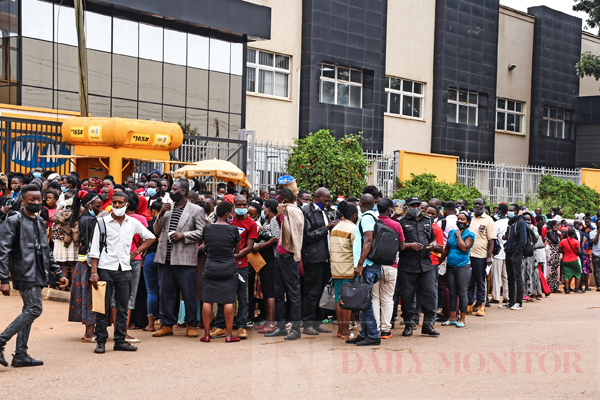Prime
Good to spread e-passport offices

People line up to pay for passports on Old Port Bell road in Kampala on February 22. PHOTO/FILE
What you need to know:
- The issue: Decentralising e-passport services
- Our view: The localisation of these offices should further ease the vetting of evidence of applicants citizenship as regional references or info will be easier to access and validate.
.
The move by Internal Affairs ministry to decentralise e-passport enrolment services to five regional offices across the country is welcome. The activation of regional offices in Arua, Gulu, Mbale, Jinja, and Mbarara now makes more accessible the e-passport with biometric features and can identify the passport with the genuine owner.
The shift from the old Machine-Readable Passport (MRP), which holds only traditional text info, a photo and the ghost image of the bearer, to the e-passport with enhanced security features, had proved problematic.
While Mbale and Mbarara regional offices could previously handle application, issuance and renewal of the MRP, the shift to new e-travel documents had rendered their technology obsolete.
But the activation of regional centres for the e-passports with a special chip linked to the National Identification Number (NIN) and holding owners’ name, date of birth, etc., should now solve this problem.
Currently, Kampala handles not less than 2,100 applications daily and also issues at least 2,000 passports per day, with applicants braving the early morning cold to line up as early as 3am to receive their passports.
Hopefully, this new move should decongest the centralised application, issuance or renewal of passports and other travel documents in Kampala. The localisation of these offices should further ease the vetting of evidence of applicants citizenship as regional references or info will be easier to access and validate. Better still, the introduction of the two-shift system at the Kampala offices, running from 8am to 8pm each day, should ease the congestion that has troubled the thousands of youths seeking passports to simplify job search opportunities in the Middle East.
Overall, this opening of these five new passport offices, just as was with the Uganda Registration Services Bureau (URSB), regional branches in Arua, Gulu, Mbale, and Mbarara, now eases passport and travel document service delivery to the grassroots. The URSB move away from Kampala offices has made registration of companies, business names, legal documents, marriages and adoptions as well as trademarks, patents industrial designs, and technovations easier.
Similarly, the right to hold a passport should be made easier because holding a passport is one of the rights that accrue to every Ugandan citizen as spelt out in the law. Indeed, the Uganda Citizenship and Immigration Control Act, Section 39, states that “every Ugandan shall have the right to a passport or other travel documents.”
This is precisely why we laud the decentralising of passport offices across the country as well-timed.




